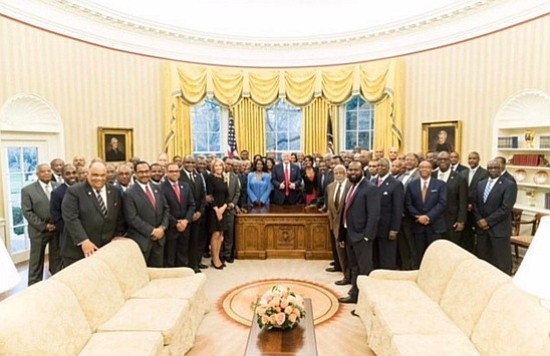TSU President Joins Collegiate Leadership at White House
Dr. Austin Lane participates in session seeking support for HBCUs
Style Magazine Newswire | 3/1/2017, 8:08 a.m.
WASHINGTON, DC– Texas Southern University President Dr. Austin A. Lane was among 64 presidents and chancellors of Historically Black Colleges and Universities (HBCUs) who attended the White House Domestic Policy Council listening session in Washington, DC. The gathering – dubbed the ‘HBCU Fly-In’ – was held amid reports of an executive order to move the initiative on Historically Black Colleges and Universities out of the Department of Education and into the White House.
President Lane, who “expressed concern about that move” in a recent interview, said that “with a new leader in the White House comes a new agenda.”
“If the agenda is about uplifting HBCUs and funding, then there has to be significant dedication and attention placed on these institutions within the Department of Education,” Dr. Lane said. “If it is through the HBCU White House Initiative, I’m all for it staying there, but it has to be effective.”
An executive order to reveal new standards of funding and federal support for Black colleges is expected to be released on Wednesday (March 1).
HBCU leaders were invited to meet President Donald J. Trump and Education Secretary Betsy DeVos in the Oval Office before the listening session. Both President Trump and Secretary DeVos expressed admiration and support of Historically Black Colleges and Universities. Vice President Mike Pence, along with Secretary DeVos, White House staff and Capitol Hill Republicans, opened the session and addressed HBCU leaders. Representatives from executive departments and agencies, including Housing and Urban Development, Management and Budget and Legislative Affairs met with HBCU leaders. The session was designed to discuss avenues to improve education, strengthen policy, and enhance the infrastructure at HBCUs.
Texas Southern University relies on federal funds to support a range of programs that impact students, faculty research and institutional educational priorities. Funding is distributed on the basis of federal policy that is shaped by the White House, federal agencies and congressional leaders. Listed below is summary of the programs for which TSU is seeking support:
· Pell Grants: Pell Grants help defray the cost of college for more than three-quarters of the students enrolled at TSU and those grants come from the U.S. Department of Education. TSU students receive $20 million annually in these federally-funded grants.
· Faculty Research Grants: Individual faculty members at TSU support their research with grants from a range of federal agencies, including, but not limited to, the National Endowment for the Humanities, the National Science Foundation, the National Institutes of Health, the Department of Energy and the Department of Education. Faculty research,
in turn, often supports the undergraduate and graduate research of our students. TSU faculty members receive an average of $6 to $10 million per year in federal research funding.
· Title III Funding: The Department of Education supplies TSU with roughly $10 million a year in Title III funding to establish and strengthen physical plants, financial management, student and academic resources and endowment building capacity.
· HBCU Federal Funding: In addition to federal funds available for all educational institutions, HBCUs are the recipients of a long list of federal funds designed specifically for this category of educational institution.
Omarosa Manigault, director of communications for the White House Office of Public Liaison, told dozens of HBCU presidents and chancellors that a new executive order would likely be revealed during the second day of the “HBCU Fly-in.” The announcement prompted applause from the presidential assembly and preceding a cadre of executive appointees lauding the impact of black colleges on the higher education and industrial landscapes.
Vice President Pence emphasized President Trump’s commitment to prioritizing the needs of HBCUs. Chancellors and presidents shared best practices and ideas on how to create a better partnership between Trump’s administration and HBCUs. The listening session included representatives from HBCU organizations such as the Thurgood Marshall College Fund, the United Negro College Fund and the National Association for Equal Opportunity in Higher Education.




